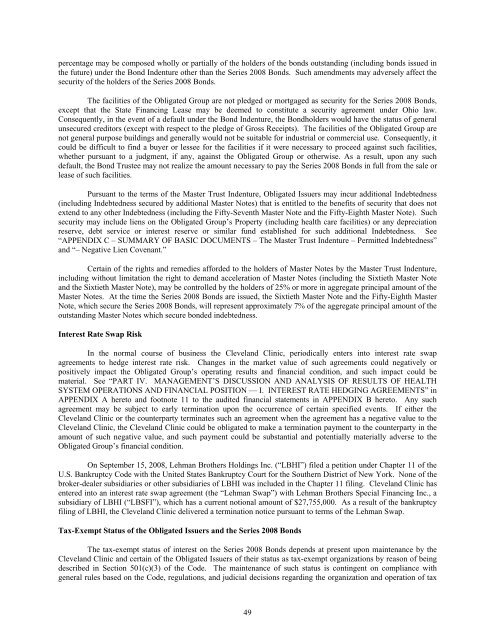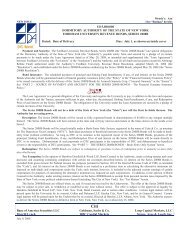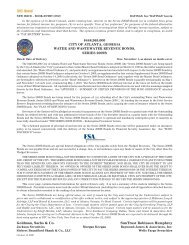Cleveland Clinic Health System Obligated Group - FMSbonds.com
Cleveland Clinic Health System Obligated Group - FMSbonds.com
Cleveland Clinic Health System Obligated Group - FMSbonds.com
You also want an ePaper? Increase the reach of your titles
YUMPU automatically turns print PDFs into web optimized ePapers that Google loves.
percentage may be <strong>com</strong>posed wholly or partially of the holders of the bonds outstanding (including bonds issued inthe future) under the Bond Indenture other than the Series 2008 Bonds. Such amendments may adversely affect thesecurity of the holders of the Series 2008 Bonds.The facilities of the <strong>Obligated</strong> <strong>Group</strong> are not pledged or mortgaged as security for the Series 2008 Bonds,except that the State Financing Lease may be deemed to constitute a security agreement under Ohio law.Consequently, in the event of a default under the Bond Indenture, the Bondholders would have the status of generalunsecured creditors (except with respect to the pledge of Gross Receipts). The facilities of the <strong>Obligated</strong> <strong>Group</strong> arenot general purpose buildings and generally would not be suitable for industrial or <strong>com</strong>mercial use. Consequently, itcould be difficult to find a buyer or lessee for the facilities if it were necessary to proceed against such facilities,whether pursuant to a judgment, if any, against the <strong>Obligated</strong> <strong>Group</strong> or otherwise. As a result, upon any suchdefault, the Bond Trustee may not realize the amount necessary to pay the Series 2008 Bonds in full from the sale orlease of such facilities.Pursuant to the terms of the Master Trust Indenture, <strong>Obligated</strong> Issuers may incur additional Indebtedness(including Indebtedness secured by additional Master Notes) that is entitled to the benefits of security that does notextend to any other Indebtedness (including the Fifty-Seventh Master Note and the Fifty-Eighth Master Note). Suchsecurity may include liens on the <strong>Obligated</strong> <strong>Group</strong>’s Property (including health care facilities) or any depreciationreserve, debt service or interest reserve or similar fund established for such additional Indebtedness. See“APPENDIX C – SUMMARY OF BASIC DOCUMENTS – The Master Trust Indenture – Permitted Indebtedness”and “– Negative Lien Covenant.”Certain of the rights and remedies afforded to the holders of Master Notes by the Master Trust Indenture,including without limitation the right to demand acceleration of Master Notes (including the Sixtieth Master Noteand the Sixtieth Master Note), may be controlled by the holders of 25% or more in aggregate principal amount of theMaster Notes. At the time the Series 2008 Bonds are issued, the Sixtieth Master Note and the Fifty-Eighth MasterNote, which secure the Series 2008 Bonds, will represent approximately 7% of the aggregate principal amount of theoutstanding Master Notes which secure bonded indebtedness.Interest Rate Swap RiskIn the normal course of business the <strong>Cleveland</strong> <strong>Clinic</strong>, periodically enters into interest rate swapagreements to hedge interest rate risk. Changes in the market value of such agreements could negatively orpositively impact the <strong>Obligated</strong> <strong>Group</strong>’s operating results and financial condition, and such impact could bematerial. See “PART IV. MANAGEMENT’S DISCUSSION AND ANALYSIS OF RESULTS OF HEALTHSYSTEM OPERATIONS AND FINANCIAL POSITION — I. INTEREST RATE HEDGING AGREEMENTS” inAPPENDIX A hereto and footnote 11 to the audited financial statements in APPENDIX B hereto. Any suchagreement may be subject to early termination upon the occurrence of certain specified events. If either the<strong>Cleveland</strong> <strong>Clinic</strong> or the counterparty terminates such an agreement when the agreement has a negative value to the<strong>Cleveland</strong> <strong>Clinic</strong>, the <strong>Cleveland</strong> <strong>Clinic</strong> could be obligated to make a termination payment to the counterparty in theamount of such negative value, and such payment could be substantial and potentially materially adverse to the<strong>Obligated</strong> <strong>Group</strong>’s financial condition.On September 15, 2008, Lehman Brothers Holdings Inc. (“LBHI”) filed a petition under Chapter 11 of theU.S. Bankruptcy Code with the United States Bankruptcy Court for the Southern District of New York. None of thebroker-dealer subsidiaries or other subsidiaries of LBHI was included in the Chapter 11 filing. <strong>Cleveland</strong> <strong>Clinic</strong> hasentered into an interest rate swap agreement (the “Lehman Swap”) with Lehman Brothers Special Financing Inc., asubsidiary of LBHI (“LBSFI”), which has a current notional amount of $27,755,000. As a result of the bankruptcyfiling of LBHI, the <strong>Cleveland</strong> <strong>Clinic</strong> delivered a termination notice pursuant to terms of the Lehman Swap.Tax-Exempt Status of the <strong>Obligated</strong> Issuers and the Series 2008 BondsThe tax-exempt status of interest on the Series 2008 Bonds depends at present upon maintenance by the<strong>Cleveland</strong> <strong>Clinic</strong> and certain of the <strong>Obligated</strong> Issuers of their status as tax-exempt organizations by reason of beingdescribed in Section 501(c)(3) of the Code. The maintenance of such status is contingent on <strong>com</strong>pliance withgeneral rules based on the Code, regulations, and judicial decisions regarding the organization and operation of tax49




